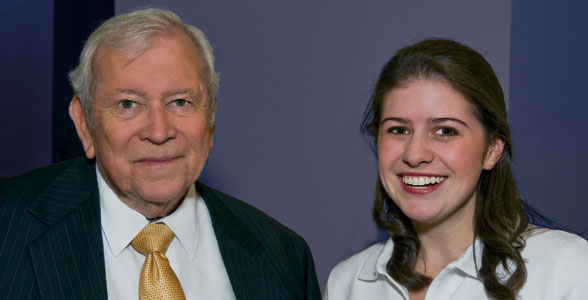By Chandra Harris-McCrary
Funded entirely with private gifts, the 53,000-square-foot $17-million Howard H. Baker Jr. Center for Public Policy at UT Knoxville celebrated its grand opening October 31 with a fireworks-capped ribbon-cutting. A dais of elected officials praised Tennessee’s former U.S senator Howard H. Baker Jr. for his outstanding career in public service.
The grand opening included a public lecture by former U.S. Supreme Court justice Sandra Day O’Connor and remarks by Tennessee Governor Phil Bredesen, U.S. Senators Lamar Alexander and Bob Corker, and U.S Representative John Duncan.
More than 250 guests came to celebrate the building’s opening and honor Baker, who served three terms as a U.S. senator and rose to national prominence during the Watergate hearings of 1973 and 1974 as vice-chairman of the Senate Watergate Committee. Baker also served as President Ronald Reagan’s chief of staff and as U.S. ambassador to Japan.
Congress awarded UT a $6-million postsecondary education grant in 2000 to help establish the center. Tennesseans serving in Congress at the time, including Senators Bill Frist and Fred Thompson, said it was appropriate that Baker’s leadership skills and contributions to public service be studied and emulated. The Baker Center was located in Hoskins Library until the new building opened last fall.
The center’s mission is to develop programs and promote research to further the public’s knowledge of our system of governance and to highlight the critical importance of public service, a hallmark of Baker’s career. A UT law graduate and longtime supporter of the university, Baker continues to help raise money and create partnerships for the center. He also provides ideas and assists in programming.
Baker said the center, located on Cumberland Avenue, is “the culmination of many years of effort” but added that its real value is looking forward—not looking back.
“Rather than just study particular issues, which the Baker Center has done and will continue to do, it will recognize and explore the real meaning of our two broad-based political parties,” Baker said.
 The new facility includes a 4,500-square-foot museum that tells the story of how government operates, using Baker’s life as a backdrop. The museum also explores modern Tennessee politics and engages students of all ages with interactive exhibits.
The new facility includes a 4,500-square-foot museum that tells the story of how government operates, using Baker’s life as a backdrop. The museum also explores modern Tennessee politics and engages students of all ages with interactive exhibits.
During this time of great challenges in our country, the Baker Center champions the two strongest solutions to our problems, a bipartisan approach to national issues and the importance of encouraging our best students to engage in public service. Every year the Baker Center selects UT’s brightest and most politically engaged students as Baker Scholars. The scholars must meet stringent academic requirements and are selected after a rigorous application process.
“It is the Baker Center’s goal to provide innovative educational initiatives,” said Justice O’Connor, who is co-chairwoman of the National Advisory Council of the Campaign for the Civic Mission of Schools, a group with which the Baker Center works. That is important, she emphasized, because more young people today can name the Three Stooges than the three branches of government.
“Unless we do something to reverse this disturbing trend, the joke may be on us,” said O’Connor, who was the first woman to serve on the U.S. Supreme Court. “I am encouraged by the work of the Baker Center in this regard. The center will link the academic strengths of UT with the larger community.”
Also housed in the building is the center’s Modern Political Archives, which holds more than a hundred collections of political papers from prominent Tennessee leaders including Senators Baker, Thompson, and Estes Kefauver; former Knoxville mayor and U.S. ambassador to Poland Victor Ashe; and former Tennessee Supreme Court justice Riley Anderson. The center also includes an auditorium, a rotunda, classrooms for educational programs and university classes, and research areas.
The Baker Center’s executive director, Alan Lowe, says the new building complements the center’s mission: “The building showcases and enhances the Baker Center’s work, making it an even greater asset to our university and our community. It provides an elegant, state-of-the-art venue for our educational programming.”



